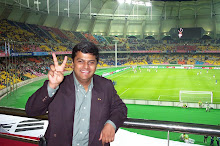“You can find yourself in the middle of nowhere – or in the middle of nowhere you can find yourself.” This was said as a voiceover in the famous SUV Advertisement that showed the vehicle driving through remote mountains. If we analyze the first part of the phrase, “You can find yourself in the middle of nowhere” – we may feel like we’re lost in the barren, empty wilderness, far away from our familiar surroundings. . When we look at the second part of the phrase, “or in the middle of nowhere, you can find yourself” – we may feel something totally different. When you find yourself in the wilderness, you have the opportunity to experience new insights about who you are and where you are going. This is a positive way of looking at it.
Being in this new place in the middle of nowhere is like traveling to a different land. The contrast between you and your life – and this new place – gives you opportunities to make new insights, new perspectives, and new awareness. The shift in space and time that happens when you enter a new land, a new frontier, or uncharted territory – allows you to make the leap to a new vision of and for yourself.
This is what I felt when I visited a winter wonderland in Northeastern US state. Though the end destination had the most popular amenities but the journey especially with the offbeat path taken and planned/impromptu breaks led me to this thought process. There was a time we were lost for many hours without modern GPS help as well as a range of mobile networks. We trusted instincts and local help to reach places we wanted to. The crispness of late December unpolluted air, mountains, babbling brooks, small bridges, and scenic roads with near to zero traffic raised the nostalgia of past excursions in the Himalayas and Sahyadris. The silence of the starry nights was magical. But somehow things were not the same as they used to be in similar past experiences in the earlier stages of life when I did most of my excursions in the Himalayas and Sahyadris. This time though the absence of internet, television, and other modern amenities were disturbing. There was an unexplained uneasiness. It only could be put to rest with the connection of our devices with the mobile data at the end destination. But this provoked me to compare my own self around 30-40 years back. There was a sense of finding a new meaning and learning new things about life while being in the middle of nowhere.
There was a similar experience in my earlier stage of life after my tenth Standard. Three of us left for a trek with some incomplete information about the trekking route embarked upon a three days walk in inner Sahyadris. Eventually, we were lost. There were no cell phones and landlines as well then. Still, we were so much at ease. We camped on an open-air field atop a mountain plateau. I still remember that starry night and those distant village lights in the valley. We were awake the whole night guarding against wildlife with strict rations on food and water. The next day we climbed down that valley reached a village. It was a risky adventure but we were so cool and composed. There was no worry or any uneasiness like what we had last week.
But then this excursion to small quaint villages and past experiences across various treks in the middle of nowhere taught a few lessons as mentioned
The Joshi’s don’t Matter: All our lives we live worry what our neighbors/relatives might think about us and our actions. (Symbolic name with due apology to all Joshis) Being appreciated and accepted socially has caused more distress to human beings than natural disasters and wars. But here in the middle of nowhere, close to nature and in synchrony with surroundings you are peace at with yourself. What’s happening in neighboring houses miles apart is hardly a concern. This is the way to go even in crowded towns and cities.
Social Media Isn’t Everything: Every action we do or every thought we cherish has some motivation to be in correlation with what we have to express about it on social media. When there is no range or connectivity in the middle of nowhere that part of 24by7 occupation is removed from your life and you remain focused on your life 100%. You are shielded from all distractions of pointless discussions, debates, and the envy of others' accomplishments/activities. This helps you focus inward towards your own happiness. You may continue doing so even when you are back in the middle of everything.
Be grateful for what you have even if it isn’t much: The situations in the middle of nowhere, where you have to live with what you have really helped you appreciate what you have in life. Though it might be not enough but the fact that you had it helped you survive. Then you can plan to procure what you don’t have and work towards it better. This is a good trait to have in routine life as well.
What you need vs. what you want: Living in the middle of nowhere, you learn quickly the difference between a need and a want. Plus, you’re not exposed to a lot of advertisements and storefronts, so it’s easy to naturally want less. We can shut ourselves up to these distractions and continue our own discretion even in daily life.
A slower life is better life: You run after each activity, each work- item: household or professional. There is no respite. In the middle of nowhere, there is no such schedule to keep. The clock just slows down at its own pace. You can use every moment to take it as you want it. This really improves the quality of life.
Don’t Just Live Life, Cherish It: We only live once.
Thanks to the middle of nowhere I found myself.


